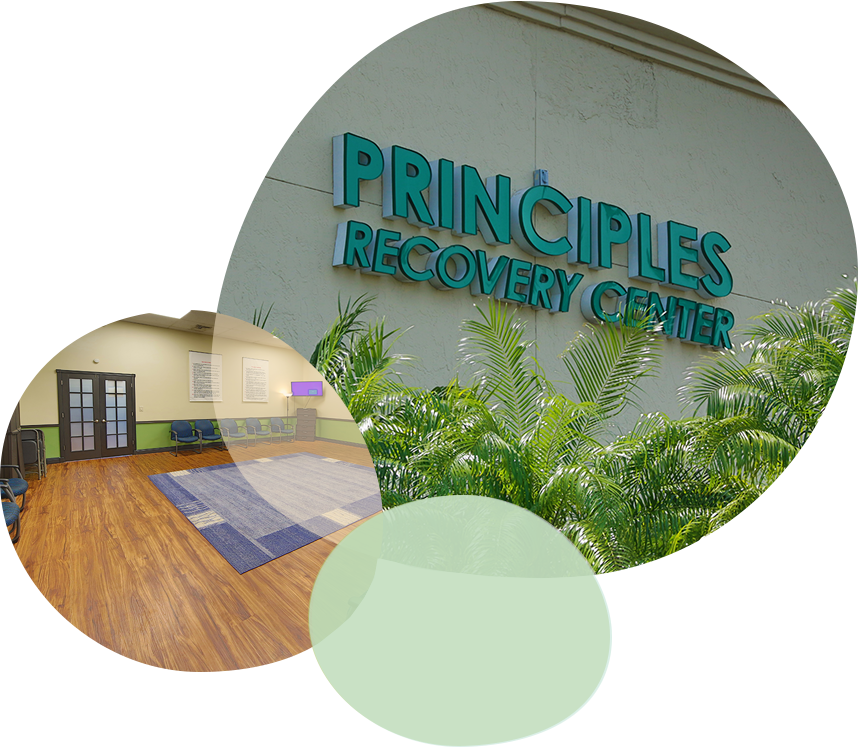
Motivational Interviewing
Therapy in South Florida
Millions of adults across the country have a diagnosable substance use disorder (SUD) and struggle with the compulsion to abuse drugs and alcohol. The state of Florida, unfortunately, is no exception to this trend with up to 15% of the state’s population meeting the criteria for an SUD.
At Principles Recovery Center, we understand that a lack of motivation can often get in the way of seeking treatment for an SUD. At our South Florida rehabilitation center, we provide motivational interviewing for addiction in Davie, Florida to help you find the motivation to change and achieve sobriety.

Unlike some other forms of therapy that seek to direct or persuade, motivational interviewing operates from the standpoint that the true power for change comes from within the individual. Counselors who engage in motivational interviewing act as equal partners who, through patience and dedicated listening, help the person in treatment ultimately discover the power to change for themselves.
It is important to note that effective motivational interviewing for addiction is not a confrontational experience. Those in recovery are not directed, instructed, or given unsolicited advice. Instead, counselors evoke talk about change through several different techniques.

Common techniques used in motivational interviewing include:
- Asking open-ended questions: These are used to draw out and explore a client’s thoughts, feelings, and reasons for change. Questions are asked that will cause a person to reflect on what makes change meaningful and achievable based on what they already know. the counselor listens and explores the person’s response.
- Affirming: This technique involves acknowledging the strengths and efforts of someone in recovery. affirmations can be seen as a way to shore up self-efficacy, or conviction that one can act successfully.
- Reflective listening: Careful and reflective listening is used to ensure understanding and empathy with the person being counseled. It’s also used to reflect back both sides of an issue, helping those in treatment recognize discrepancies in their thought processes.
- Summarizing: These are used to bring together important parts of the conversation and highlight points that have been made about change. It is a way to focus on progress and build motivation for change.
- Attending the language of change: Counselors are trained to notice how people speak of change, whether it is something they want to do or have done. They help clients focus on the positive aspects of change and find ways to achieve success.
- Exchanging information: Throughout the motivational interviewing process, counselors provide feedback and information related to the individual’s experiences with substance abuse. This includes discussing potential risks and consequences of continued drug or alcohol use.
These techniques allow the therapist to understand the client’s perspective and guide them toward finding their own motivations for recovery.
Motivational Interviewing for addiction or otherwise is made up of four fundamental processes. These processes describe the structure of conversations between the counselor and the person in treatment. They are:
- Engaging: This process involves building trust between the counselor and client by establishing a collaborative relationship. The counselor works to understand the person’s perspective, show empathy, and create an open and non-judgmental environment.
- Focusing: Once engagement is established, the counselor helps the client identify their goals for therapy. Together, they focus on what change looks like for the individual and what motivates them to make changes.
- Evoking: In this process, the counselor helps the person in treatment explore their ambivalence about change and encourages them to consider the positive aspects of making a change. This can lead to a shift in perspective and an increase in motivation.
- Planning: Finally, motivational interviewing ends with planning for action. The counselor and client work together to identify specific steps and strategies for achieving the desired change.
These fundamental processes help relay that motivational interviewing, at its core, is a method of communication rather than an intervention. It is a collaborative and client-centered approach that empowers individuals to find their own motivation for change.
When is Motivational Interviewing Used?
When the following factors are present, motivational interviewing can help people examine their situation and make strides to bolster their motivation for change:
- High ambivalence: People who are stuck in negative or mixed feelings about change are often helped by motivational interviewing—especially if they have the desire to change but not the motivation.
- Low readiness: those who are “not ready” for treatment can benefit from MI therapy, as it encourages them to explore their feelings about changing and helps them increase their motivation.
- Lack of importance: When the advantages and disadvantages of change are unclear, motivational interviewing can be beneficial by helping people realize the importance of change and find their reasons to commit to it.
- Low confidence: Many people with an SUD have a long history of failed attempts to change, so they feel hopeless and lack confidence. Motivational interviewing can help identify the specific barriers that keep them stuck in their addiction and develop practical strategies to overcome them.
When you seek rehabilitation at Principles Recovery Center, the treatment methods you engage in will be largely based on your needs. Since no two people experience addiction in the same way, each recovery plan is tailored toward helping you overcome your particular challenges. However, you can expect some sort of motivational interviewing for addiction to be a part of your treatment plan
Never Be Alone Again
Come Join Our Recovery Family
Key Benefits of Motivational Interviewing for Recovery
 Motivational interviewing boasts a range of benefits for individuals in addiction recovery. Through motivational interviewing at Principles Recovery Center, you will be provided an opportunity to:
Motivational interviewing boasts a range of benefits for individuals in addiction recovery. Through motivational interviewing at Principles Recovery Center, you will be provided an opportunity to:
- Discover personal motivations: Unearth your inner motivations that fuel your desire for change.
- Gain insight: Reflect on the personal roadblocks and understand what’s preventing progress.
- Build confidence: Grow your confidence in your ability to make and sustain life changes.
- Set goals: Establish achievable and meaningful objectives for yourself.
- Learn and develop skills: Equip yourself with the necessary tools and skills for successful recovery.
- Maintain focus: Keep momentum going and sustain your focus throughout your recovery.
- Experience empowerment: Feel empowered as you become the agent of your change, taking control of your life.
The goal of motivational interviewing for addiction is not to impose solutions or personal opinions on the client, but rather to guide them in exploring and resolving their own ambivalence towards change. This can be particularly helpful for those recovering from addiction as they may have conflicting feelings about giving up substances that have become a coping mechanism or source of pleasure.
In addition, motivational interviewing for addiction can also be used to address underlying issues that may contribute to addiction such as trauma, mental health disorders, or relationship problems. By addressing these underlying issues, clients can gain a better understanding of their motivations and develop healthier coping mechanisms.
Comprehensive Addiction Treatment Programs
Some of our programs include:
- Outpatient Addiction Treatment (OP): For those seeking flexibility as they pursue their recovery without residential care.
- Intensive Outpatient Programs (IOP): More focused than OP, IOP provides a structured treatment plan without full-time commitment.
- Partial Hospitalization Programs (PHP): A bridge between inpatient treatment and outpatient services, offering intensive care while allowing clients to live at home.
- Dual Diagnosis Treatment: Specialized care for individuals who face concurrent mental health conditions along with substance use disorders.
If you are ready to rediscover the motivation within and embark on a life-changing journey toward recovery, one of our comprehensive addiction treatment programs at Principles Recovery Center may be the right fit for you.
Motivational Interviewing at Principles Recovery Center
Motivational interviewing for addiction is a compassionate and empowering form of addiction therapy designed to evoke the intrinsic motivation needed for initiating change in your life. If you or a loved one is ready to embark on the path to recovery, this technique can be pivotal in igniting the drive towards your long-lasting sobriety.
Located in Davie, Florida, Principles Recovery Center is at the forefront of delivering innovative therapy like motivational interviewing for addiction within a holistic and patient-centered framework. We’re dedicated to guiding individuals throughout their journey and providing the support they need every step of the way. Contact us today to learn more about how motivational interviewing can play a transformative role in your life or the life of someone you love.